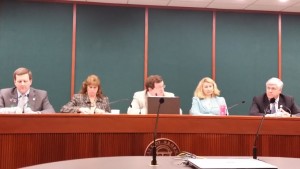Sen. McKoon Rushes Religious Freedom Bill without Notice, Transparency
 (APN) ATLANTA — On Monday, March 02, 2015, the Senate Judiciary Civil Committee passed an amended version of SB 129, the Georgia Religious Freedom Restoration Act.
(APN) ATLANTA — On Monday, March 02, 2015, the Senate Judiciary Civil Committee passed an amended version of SB 129, the Georgia Religious Freedom Restoration Act.
The amended version states in the legislative findings but not in the operative text of the bill that courts “have consistently held that government has a fundamental, overriding interest in eradicating discrimination.”
However, advocates like Jeff Graham of Georgia Equality are concerned that the definition of “compelling government interest” in the proposed law itself does not include eradicating discrimination.
The debate on SB 129 as amended happened so fast–in about ten minutes, with no advance notice–so that not all the committee members were in the room to vote on it.
State Sen. Josh McKoon (R-Columbus) has rushed the legislation through the process, including by failing to make the substitute language available to the public at the committee hearing.
Atlanta Progressive News checked with the Clerk’s office shortly after the committee hearing, but they did not have a copy.
State Sen. Vincent Fort (D-Atlanta) complained that he took a break to visit the restroom and missed the vote, according to the Atlanta Journal-Constitution’s Political Insider blog. Sen. Fort has been a vocal opponent of the bill.
The amended version of the bill was not made available online until today, Wednesday, March 04, 2015.
The committee members who were present all voted unanimously to accept the substitute language.
They were Sen. Josh McKoon (R-Columbus) , Sen. Charlie Bethel (R-Dalton), Sen. Bill Cowsert (R-Athens), Sen. John F. Kennedy (R-Macon), Sen. William Ligon Jr. (R-Brunswick), and Sen. Jesse Stone (R-Waynesboro).
As previously reported by APN, Sen. Cowsert had attempted to introduce an amendment at a previous committee hearing on February 19, 2015, which would have clarified that protecting citizens against discrimination is a compelling government interest.
Cowsert’s failed February 19 amendment defined “compelling government interest” to read that it “includes but is not limited to protecting the welfare of a child from abuse or neglect as provided for by laws of this state and protecting individuals against discrimination.”
This amendment would have done more to help alleviate the concerns of the LGBTQI community, who are concerned that courts might not see preventing discrimination as a compelling government interest, and thus interpret the law to allow religious freedom to be used as a license to discriminate on the basis of sexual orientation.
However, McKoon did not allow the February 19 Cowsert amendment because he said there was no 24 hour notice.
For all of McKoon’s alleged concern about notice, McKoon did not seem concerned that the public did not have any notice–advance or two days subsequent–of his own amended paper.
While the statement about the government’s fundamental, overriding interest in preventing discrimination could be persuasive to a court that is looking to interpret what “compelling government interest” means, it would certainly be stronger to have the term explicitly defined to include preventing discrimination.
But that language did not find its way into the bill on Monday.
“The bill does not have a definition of a compelling government interest,” Cowsert said during the committee hearing.
“That was an amendment I attempted to bring last week. I felt like since the original version did define a compelling government interest that we should make it clear that prevention of discrimination, as in the finding here, is a compelling government interest,” Cowsert explained.
“I believe this version of the bill strikes the right balance in line 34 that recites that the high courts have a consistently held that government has a fundamental, overriding interest in eradicating discrimination,” he said.
“The objections we have to the bill is they put in the preamble section – it is a ‘compelling government interest’ to protect against discrimination. However, that’s not part of the statutory language,” Jeff Graham told APN.
“They have revised the language but not changed anything. It still opens the door to discrimination. It still defines corporations as people, which is opposed to what Sen. McKoon has said publicly – this bill would not be used to describe people as corporations,” Graham said.
Senate Democrats did not know the legislation was on the agenda, but, coincidentally, conservative supporters turned up at the State Capitol for a rally in support of SB 129 and HB 218 and Kevin Cochran.
The bill now heads to the Full Senate for a vote on tomorrow, Thursday, March 05, 2015.
McKoon did not return a voicemail from APN following Monday’s Committee meeting seeking comment.
(END/2015)